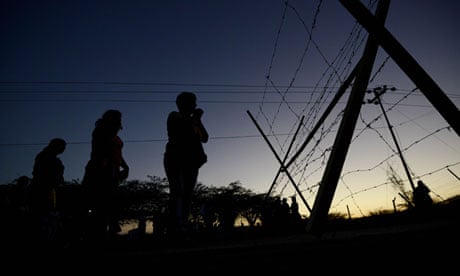Venezuelan authorities finished removing inmates from one of the country's biggest prisons on Sunday, after more than two days of gunfights and rioting that left 61 people dead and more than 100 injured.
The killings, which were sparked by an attempt to confiscate illegal weapons at the notoriously overcrowded Uribana jail, pose a serious challenge for a government whose ailing leader, Hugo Chávez, has not been seen since he flew to Cuba six weeks ago for cancer surgery.
According to local media reports, the search had been planned for dawn on Friday at the prison complex in the western city of Barquisimeto, but the heavily-armed inmates resisted, sparking one of the deadliest riots in the country's history.
After two days of sporadic shooting and reports of killings by inmates, the authorities declared the prison's closure.
The director of the city's Central hospital, Dr Ruy Medina, told the AFP news agency that his facility had received nearly 90 injured men, all of them suffering from gunshot wounds.
Medical authorities say the death toll has now climbed to 61 and could rise further. The government has yet to confirm the full list of casualties.
Television news bulletins showed relatives crowded outside the hospital and the prison in search of information.
Iris Varela, Venezuela's penitentiary services minister, said the decision to search and disarm the men had been taken after authorities learned that rival gangs were preparing to confront each other in order to seize control of the facility.
She said the element of surprise was lost, however, because reporters gave advance warning of the search.
"This Friday we were surprised by the information announced on [the private television channel] Globovision, social network sites and the webpage of El Impulso newspaper," said Varela, who called the reports an "obvious trigger for violence".
But civil rights activists said the inmates and their relatives had long anticipated the government's plan. The deeper problem, they said, was that the authorities used a disproportionate amount of force in a prison that was already at breaking point.
Venezuela's prison system is among the most violent and overcrowded in the world. Originally built for 12,000 inmates, the country's 33 jails house nearly 47,000 people. Guards are notable by their absence, leaving gang bosses free to run lucrative drug dealing operations from their cells.
Guns and knives are widespread, as is murder. NGOs and human rights watchdogs reported that 560 people were killed in prison in 2011.
Uribana, one of the worst facilities, is known for its weekly "coliseum" contests, where inmates fight scheduled battles as crowds of convicts cheer, jeer and film the bloodshed.
There have been riots in the past. Last year, the military needed three weeks to restore order at La Planta prison in Caracas, after a protest at plans to move inmates to another jail.
The latest botched disarmament operation comes at a politically sensitive time with Chávez out of the country and in uncertain health.
In its latest bulletin, the government said the president was still being treated for breathing problems, but that he had overcome the respiratory infection that followed his operation.
His stand-in, vice-president Nicolás Maduro, was greeted with the news of the prison riot on his return from Chávez's bedside in Havana. He promised an investigation into the incident, but insisted the operation was an important step forward.
"This plan has been carried out with patience so that jails are freed from the violence, the mafias, drugs and deaths that have long plagued them," Maduro told the state channel VTV. "It's an evil that is there and which we have not resolved."
The opposition leader Henrique Capriles said the violence was the consequence of "incompetent and irresponsible government".
